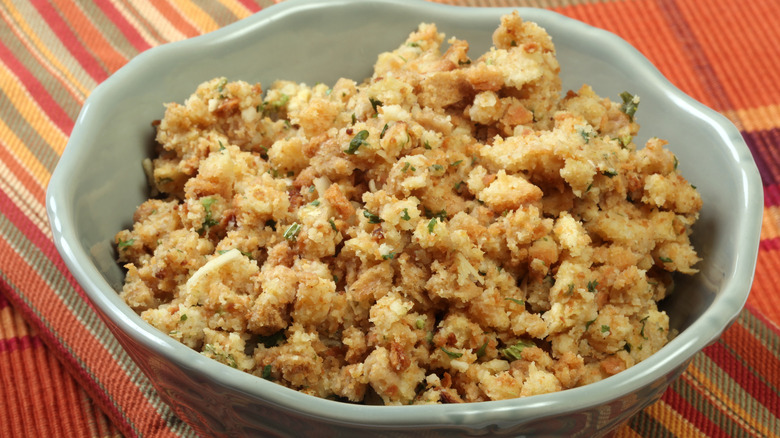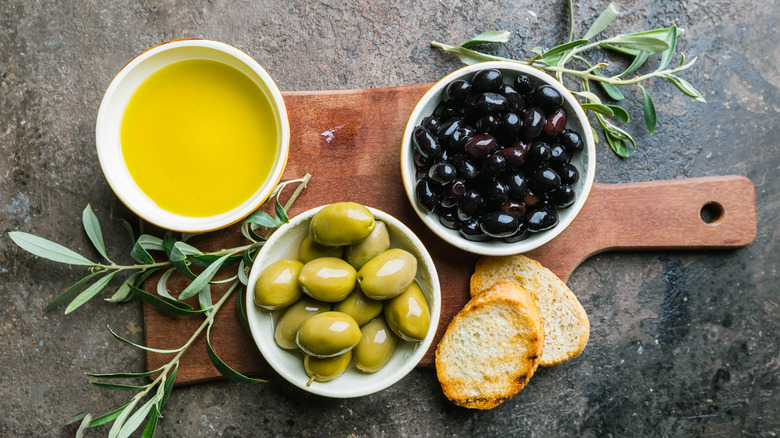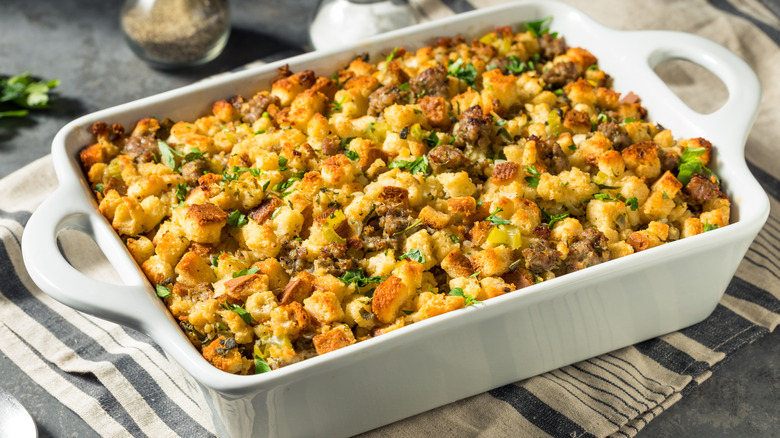Sneak Some Black Olives Into Your Stuffing For An Umami-Filled Side
Whether you're using it to fill a cooked turkey during the holiday season or just making it for a casual weekday dinner, stuffing (or dressing if you're a southern foodie), is a crave-curbing side dish that has an irresistible down-home appeal. The primary ingredient in stuffing, however, is just bread. And as much as we worship bread in all of its forms, without infusions, it doesn't have a significant flavor of its own, which means that your stuffing can fall flat if you don't dress it up (pun intended). Enter black olives.
Although it's an unconventional addition to this holiday classic, black olives can impart a sharp umami flavor to a bland batch of stuffing. With their brininess and intense depth of flavor, there's nothing boring, bland, or banal about black olive-kissed stuffing. Black olives are versatile and can work well with a wide variety of stuffing recipes. Whether you're making a traditional stuffing or experimenting with an eclectic blend of ingredients, black olives complement it all.
Remember, it's all about subtlety, so be careful not to overdo it. Like a culinary secret agent, introducing black olives to your stuffing requires a stealthy touch — just a handful of these briny gems can transform your dish from ordinary to extraordinary. To weave them into your stuffing with finesse, chop up a modest amount of black olives as finely as possible and distribute them evenly throughout the recipe to ensure that you're not overpowering the dressing with a salty brine.
Black olives versus other varieties
Before you buy a jar of olives to amp up the flavors in your stuffing, consider the differences between black olives and other olive varieties. There are more than 1,000 types of olives that grow worldwide, but we'll focus on the basics.
For starters, black olives and green olives are actually the same fruit, but green varieties are harvested while unripe and black varieties are plucked from the olive branch once they've fully ripened. Most of the olives you find at the supermarket are submerged in some kind of salty solution, but the flavor difference between green and black olives comes down to their respective brining process. Both varieties are often soaked in lye (sodium hydroxide), but green olives are fermented in brine while black olives are cured in brine. Because of these differences, black olives are generally less bitter than their green counterparts, making them the ideal choice for stuffing.
Some common types of black olives include niçoise, mission, and kalamata olives. Whichever type you choose, pitted black olives are the best option for a stuffing recipe as they eliminate the challenge of chopping around a large seed.
Double stuffing, anyone? Some black olives are packed with funky cheeses at their center where the pit once resided. If you're feeling particularly adventurous, stuffed olives can bring a creamy richness to your dressing, but don't forget, subtlety is essential.
Additional pairings
A great stuffing recipe relies on a well-selected lineup of spices, herbs, aromatics, and finely chopped veggies. So what exactly pairs well with black olives in a heaping batch of stuffing?
Rosemary can bring an earthy and woody aroma to the stuffing, creating a robust backdrop for that umami kick courtesy of the black olives. Garlic introduces a familiar allium flair, with a mouth-watering boldness that complements the olives by curbing their intensity without overshadowing their distinct flavor. Chopped celery is a common stuffing ingredient that is tenderized and mellowed out when cooked. It can contribute to a subtle herbal quality that pairs nicely with the sharpness of olives.
If you want to up the ante on the umami, consider adding finely chopped mushrooms or mixing in a humble amount of miso paste or soy sauce to deepen the overall flavor profile of the olive-graced stuffing.
If you accidentally add too many olives and wind up with a batch of stuffing that is too salty, introduce a gentle amount of citrus juice or vinegar to mellow it out. Adding an acid to a dish that is unpleasantly salty won't introduce conflicting flavors into the stuffing but will deftly mute the saltiness, restoring balance to your jaw-dropping dressing.


